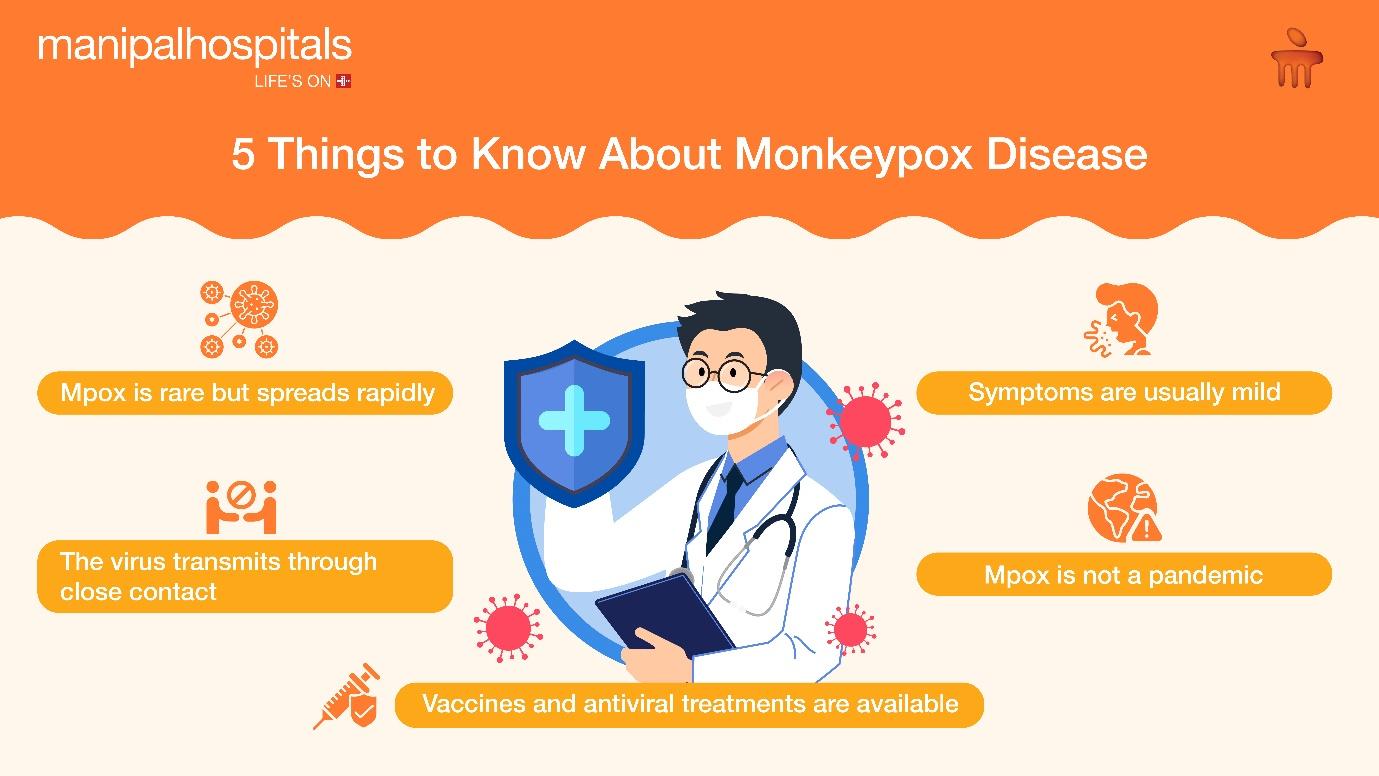
The COVID-19 pandemic heightened our fear of rapidly spreading infections, including monkeypox. Also known as Mpox, monkeypox is an infectious viral disease that became a global concern in 2022, with over 90,000 cases reported worldwide. While the initial outbreak was contained, a new strain has recently emerged, leading to increased cases and renewed concern. While it is important to stay informed about Monkeypox, there's no need for panic. Here are five key points to understand:

-
Mpox is rare but spreads rapidly
Scientists first discovered monkeypox in 1958 during an outbreak in monkey colonies in Denmark. Since it is a zoonotic disease, one may only contract it once one comes in contact with the animal source. The disease's origins remain unknown despite its name, though African rodents and non-human primates could be possible virus carriers. Mpox is caused by a virus that belongs to the Poxviridae subfamily and is similar to smallpox but less severe. Recent outbreaks in several countries outside Africa have raised concerns due to its rapid spread as the new strain appears to infect humans very quickly.
-
Close contact transmits the virus
The Mpox virus spreads through close contact with infected animals (zoonotic transmission) or humans. Human-to-human transmission happens through direct contact with rash lesions, bodily fluids, contaminated materials, or respiratory droplets during prolonged interactions with the infected individual. While not as contagious as COVID-19, close contact with an infected individual significantly increases transmission risk. The Mpox disease is even more detrimental for pregnant women as they can transmit the virus to their foetuses.
-
Symptoms are usually mild
Symptoms of monkeypox virus typically appear 5-13 days after infection, though they can take up to 21 days to manifest. Most people experience mild symptoms, including:
- Fever
- Headache
- Muscle aches
- Swollen lymph nodes
- Exhaustion
- A characteristic rash
The rash progresses from flat lesions to raised bumps, water-filled pustules and eventually scabs. Mpox symptoms usually resolve within a few weeks, and most cases are self-limiting.
-
Vaccines and treatments are available
Although there's no specific treatment for monkeypox, certain antiviral medications can help alleviate symptoms. Additionally, while no vaccine exists specifically for monkeypox virus treatment, a Mpox vaccine has shown 85% efficacy against it. Healthcare providers administer this vaccine to individuals exposed to the monkeypox virus, potentially preventing them from developing it.
-
Monkeypox is not a pandemic
Unlike COVID-19, Monkeypox doesn't spread as easily or rapidly. The disease remains endemic to Western and Central Africa, although with a lower death rate. While current outbreaks are concerning with the increasing numbers, monkeypox disease is not a pandemic.
Conclusion
Understanding the information about Mpox disease helps you to avoid panic and take the necessary precautions. Here are some ways you can protect yourself and others from monkeypox disease:
- Avoiding close contact with symptomatic individuals
- Practising good hygiene
- Seeking medical attention if you experience concerning symptoms
If you are worried about monkeypox, don't hesitate to consult our specialists at Manipal Hospitals, Vijayawada. Our team is equipped to provide expert care, including diagnosis, treatment, and guidance on preventing the spread of the disease.
FAQ's
Mpox is a viral infection caused by the monkeypox virus, which belongs to the same family as smallpox.
Mpox spreads through close contact with an infected person, animal, or contaminated materials. This includes skin-to-skin contact, respiratory droplets, and touching infected items.
Common symptoms of the monkeypox virus include fever, headache, muscle aches, swollen lymph nodes, and a distinctive rash that progresses from flat lesions to raised bumps, blisters, and scabs.
Monkeypox treatment mainly focuses on managing symptoms. In severe cases, antiviral medications may be used.
No, despite similar names, Mpox and chickenpox are caused by different viruses and are not related.
An infected person is contagious from the onset of symptoms until all scabs have fallen off and a fresh layer of skin has formed.



















 4 Min Read
4 Min Read

.png)











